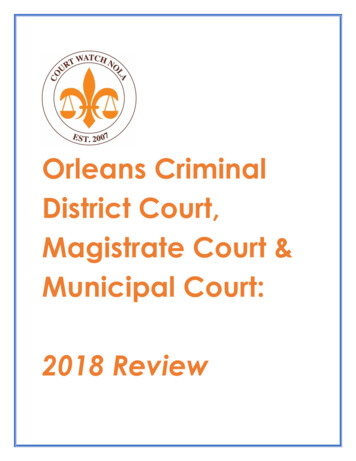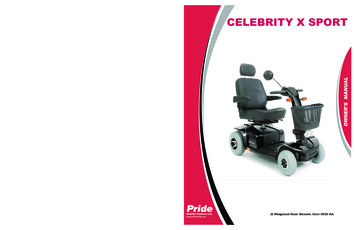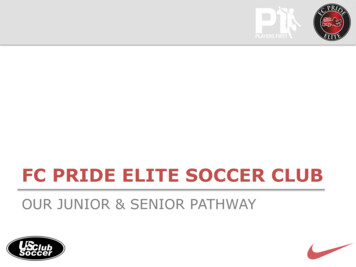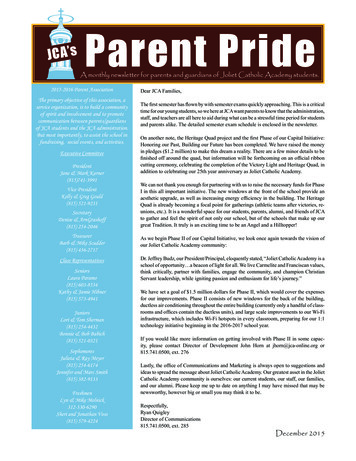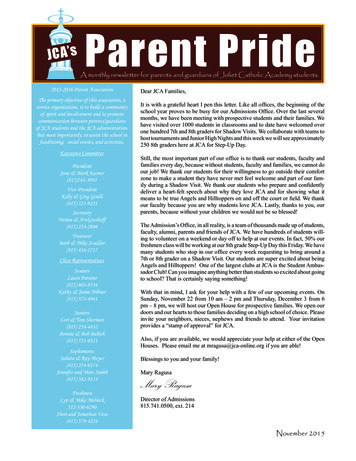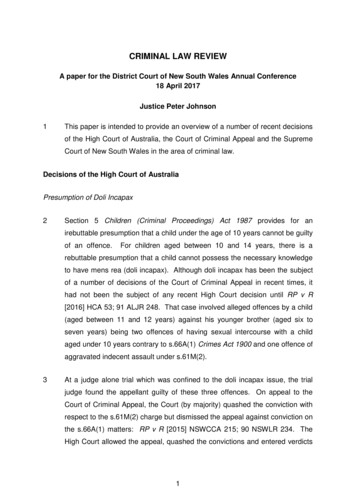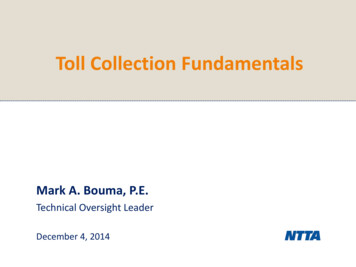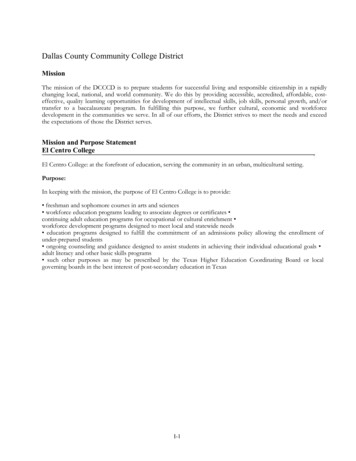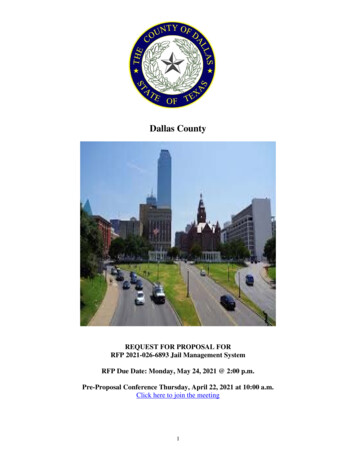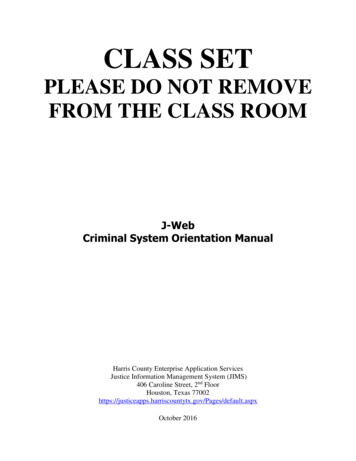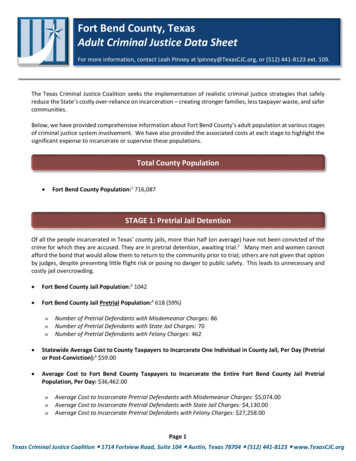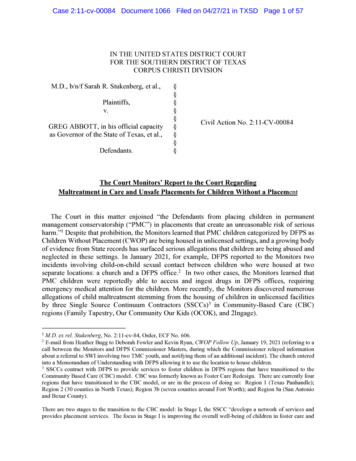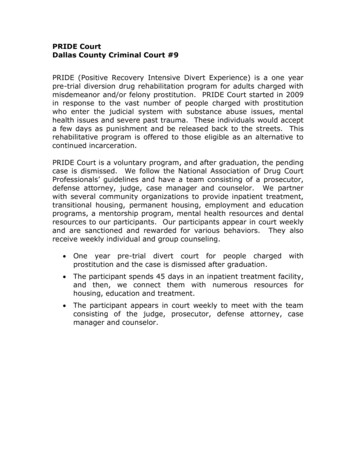
Transcription
PRIDE CourtDallas County Criminal Court #9PRIDE (Positive Recovery Intensive Divert Experience) is a one yearpre-trial diversion drug rehabilitation program for adults charged withmisdemeanor and/or felony prostitution. PRIDE Court started in 2009in response to the vast number of people charged with prostitutionwho enter the judicial system with substance abuse issues, mentalhealth issues and severe past trauma. These individuals would accepta few days as punishment and be released back to the streets. Thisrehabilitative program is offered to those eligible as an alternative tocontinued incarceration.PRIDE Court is a voluntary program, and after graduation, the pendingcase is dismissed. We follow the National Association of Drug CourtProfessionals’ guidelines and have a team consisting of a prosecutor,defense attorney, judge, case manager and counselor. We partnerwith several community organizations to provide inpatient treatment,transitional housing, permanent housing, employment and educationprograms, a mentorship program, mental health resources and dentalresources to our participants. Our participants appear in court weeklyand are sanctioned and rewarded for various behaviors. They alsoreceive weekly individual and group counseling. One year pre-trial divert court for people chargedprostitution and the case is dismissed after graduation.with The participant spends 45 days in an inpatient treatment facility,and then, we connect them with numerous resources forhousing, education and treatment. The participant appears in court weekly to meet with the teamconsisting of the judge, prosecutor, defense attorney, casemanager and counselor.
PRIDE CourtPositive Recovery Intensive Divert ExperiencePARTICIPANT HANDBOOKCriminal Court #9Honorable Judge Peggy HoffmanPublic Defender: Christi CaballeroDistrict Attorney: Brittany DunnCase Worker: Lorena VillalvaCounselor: Colleen Hamlin1
Table of ContentsMission Statement/Goals . 3Referral Process . .4Phases of Program. . .5Rules of Program . .7Conditions of Bond . . .8CATS Release of Information .10Screening Tools .11Sanctions/Incentives 15Incentive Point System 162
PRIDE Mission StatementPRIDE court was established to address the needs of men and women that havesubstance abuse and/or mental abuse issues and face prostitution charges. Theseindividuals typically spend their time in jail and are released back onto the street tofend for themselves. This program is designed to intervene when the person enters jailand help them make life altering changes in their everyday life. The goal is for themto live clean and independent lives. The program helps them achieve this by givingthem inpatient drug treatment, transitional and permanent housing, counseling, andimportant life skills. PRIDE Court goals are as follows: Promote self sufficiency by addressing substance abuse, medical and mentalhealth issues through appropriate services. Reduce the number of medical, mental and drug related deaths in relation to theprostitution offender. Integrate substance abuse, medical and mental /health treatment with participantaccountability through continued judicial monitoring. Promote abstinence from illicit and illegal drugs as well as prostitution. Enable the participant to become a productive member of society througheducation and community resources. Provide counseling to address past trauma related issues.3
Intake/Referral ProcessTo qualify, a potential participant must meet the following criteria: Have an unadjudicated (pre-plea) misdemeanor or state jail felony prostitutioncharge. Have an unadjudicated misdemeanor possession of marijuana chargeaccompanied by a prior prostitution conviction in the past 3 years. Must have a drug/alcohol problem as determined by the drug screening tool Must score at least 75 out of 100 on the Willingness to Change tool. Must want to make a change in their life.Disqualifying circumstances include but are not limited to the following: Violent charges in their history, i.e. robbery, assault,harassment, murder, etc. Denial of using drugs/alcohol Not willing to spend 45 days inpatient drug treatment Already on probation currently (may consider on case by case basis) Have a pending unrelated felony chargeHow we get our clients:A potential participant is arrested and tagged in AIS (Adult Information System) ifcharged with a misdemeanor/state jail prostitution charge. The PRIDE case manager willreview the list each morning and send qualifying participants to the DA fora complete background check. The client must meet the previously discussed criteria.The DA will decide if the client is legally appropriate for the PRIDE court.Any qualifying potential client names will be sent to the Case Manager and then bebrought down on the jail chain by the court coordinator the following morning for ascreening in CCC#9.The screening includes substance abuse, mental health, and willingness to change andwill be conducted by the counselor and case manager. A decision will be made at thatpoint as to whether the client will be accepted. Disqualifying events would be if theperson does not use drugs or alcohol, if the client is unwilling to participate, or the clientscores less than 75 out of 100 on the Willingness to Change screening tool.If they qualify, the Public Defender will speak to the potential participant and have themsign a PR Bond and the conditions of bond.Once the paperwork is complete, the court clerks will process the PR Bond and place ahold for Nexus on AIS. An email is sent to Nexus and they will be released for treatmentwhen a bed becomes available.4
Phases of ProgramPhase One: Stabilization 0-4 months-45 days inpatient treatment at Nexus Treatment FacilityEnter transitional housing after released from NexusAttend court once a weekAttend case management once a week with Case ManagerAttend individual counseling once a week with the in-house counselorAttend group counseling once a weekSubmit to weekly/random drug testingAttend NA/AA meetings at least 3 times a week and obtain a sponsorBecome stable on medicationGet ID and any other documentation neededStart Intensive Outpatient treatment (IOP) at treatment facilityStart Supportive Outpatient treatment (SOP) after graduation from IOPAttend NA/AA meetings at least 3 times a week and obtain a sponsorPhase Two: Treatment 4-9months- Attend court once a week- Attend case management once a week with Case Manager- Attend individual counseling once a week with the in-house counselor- Attend group counseling once a week- Submit to weekly/random drug testing- Attend NA/AA meetings at least 3 times a week and obtain a sponsor- Begin process for obtaining permanent housing- Complete IOP and SOP and begin Aftercare- Attend New Life Opportunities group counseling after graduation fromSOP- Begin education (GED, college or trade school)- Begin search for employment- Start working on step work with sponsor- Enter Mentor programPhase Three: Graduation Phase 9-12 months-Attend court once a weekAttend case management once a week with Case ManagerAttend individual counseling once a week with the in-house counselorAttend group counseling once a weekSubmit to weekly/random drug testingAttend NA/AA meetings at least 3 times a week and obtain a sponsorContinue process to obtain permanent housing5
-Continue education and employment searchAttend New Life Opportunities group counselingContinue step work with sponsorMust attend graduation ceremony in order to complete program** Phases and requirements are subject to change on an individual basis6
Rules of Program-----Cease all alcohol and drug related activity Any relapses must be reported to counselor and case manager. Refrain from using any prohibited drug/medication or anymedication not prescribed to participantComply with drug and alcohol screenings Any diluted UA may be treated as a positive UAAttend all scheduled meetings and appointments, at the time scheduled This includes court, case management meetings, counselingsessions, IOP, SOP and any other scheduled appointments PRIDE Court team will hold weekly discussions regardingparticipants’ behavior and progressTreat others with respect This includes everyone--other participants in the program,court workers, etc. Profanity, verbal or physical threats will not be tolerated Information that participants learn about other participantsshould only be discussed with the PRIDE Court team or duringcourt or counseling sessionsDress appropriately for court and treatment sessions and maintainproper decorum See attached dress code Do not chew gum, eat or drink in court or treatmentAbstain from any romantic relationships or contact with peopleinvolved in prostitution or drug use Participants should not have any relationships in which theyare using someone for the purpose of gaining money or othermaterial things. Participants should not have any romantic relationships Participants should not have any relationship with an unrelatedmember of the opposite sex Participants should not have any contact with people involvedin prostitution or drug use7
PRIDE COURT CONDITIONS OF BOND1. I will attend 30-45 days of inpatient drug treatment at a treatment facility namedby the Court (usually Nexus). I understand that I cannot choose the treatmentfacility at which I am placed. I will be picked up from jail and taken directly tothe facility; in the event that I am not taken directly to the facility, I will contactmy case manager and my attorney immediately. If a situation like this occursduring court operating hours (8:00 a.m. to 4:30 p.m.), I will present myself inCounty Criminal Court #9 on the 4th floor of the Frank Crowley Criminal CourtsBuilding. If such a situation occurs outside of court operating hours, I will presentmyself in County Criminal Court #9 at the earliest opportunity, unless directedotherwise by my case manager or attorney.2. After successfully completing inpatient treatment, I will live in transitionalhousing for at least 60 days, unless directed otherwise by the PRIDE Court team. Iam not responsible for finding my own transitional housing.3. Once I am released from inpatient treatment, I agree to attend and successfullycomplete Intensive Outpatient Treatment (IOP).4. I agree to report to court (County Criminal Court #9 on the 4th floor of the FrankCrowley Criminal Courts Building) every Thursday at 2:00 p.m.5. I agree to report to my case manager once a week once I leave inpatient treatment.The appointment date and time is to be arranged with my case manager.6. I agree to see my counselor once a week for individual sessions and once a weekfor group sessions. Group sessions take place on Thursdays at 11:00 a.m.Individual sessions are arranged weekly with my counselor.7. I have received a copy of the rules of the program and agree to follow all rules.8. I understand I may be sanctioned for failure to participate in the program and/orfor not following the rules of the program. Some behaviors that may triggersanctions include, but are not limited to, the following:a. Missing any appointments/being late to appointments (including weeklycourt dates and counseling sessions)b. Testing positive for drugs/alcoholc. Lyingd. Not making NA/AA meetingse. Moving without permissionf. Breaking house rules9. Sanctions may include, but are not limited to, the following:a. Writing an essay on a subject as directed by the Judge and/or the PRIDECourt teamb. Reporting more oftenc. Increased drug testingd. Increased length of counselinge. Community servicef. Back-phasing (being moved back to an earlier phase in the program)g. Jail timeh. Admonishment from Judge8
i. Geographical restrictions (i.e., not being able to leave transitional housefor certain periods; being directed to avoid certain areas in the city)j. Termination from PRIDE programClientDateWitnessDatePublic DefenderDate9
CATSRelease of InformationI, DOB , give permission to :CATS/PRIDE COURT PersonnelTo release all information obtained from this screeningTo: PRIDE Court team, Homeward Bound NLO, NEXUSfor the purpose of determining eligibility into the PRIDE Court.This consent to release such information can be revoked only by your writtenrequest and will expire one year from the date signed below.Client SignatureDateCounselor SignatureDateWitnessDatePublic DefenderDate10
PRIDE Court Drug Screening Questionnaire1. Do you use drugs or alcohol? If so, how much and how often?DRUGHOW MUCHHOW OFTENLAST USEYNHOW LONG2. Have you ever been treated for alcohol or drug problems?a. When and Where?YN3. Were you intoxicated at the time of your arrest?YN4. Has anyone ever expressed to you that they are concernedabout your drug/alcohol use?YN5. Have you ever tried to stop or cut down your use but couldn’t?YN11
Willingness to ChangeName: DOB:Date:Total:On a scale of 1-10, 1 being unwilling and 10 being the most willing, answer the followingquestions:1. I want to quit prostituting12345678910567891056789109109109102. I would like help to turn my life around12343. I would like to quit using drugs12344. I am willing to report to court and probation once a week123456785. I am willing to go to inpatient drug treatment for 45 days123456786. I am willing to participate in the court program for 1 year123456787. I am willing to abstain from illegal sexual behaviors to focus on myself1234567891089109109108. I am willing to attend ongoing counseling for a year12345679. I am willing to live in transitional housing for minimum of 60 days1234567810. I would like to find stable employment and continue my education1234561278
Mental Health Screening1. Have you ever been to a psychiatrist, or been to MHMR/Lifenet/Adapt/MetrocareYNYNYNIf yes, whenWhere?2. Are you currently in any type of mental health treatment?If yes where?When did you last see your Dr./therapist?3. Were you ever prescribed medication or drugs for psychiatric or emotional problems?If yes, list medicationsAre you taking them now?YNYN4. Have you ever been hospitalized for psychiatric reasons?If yes where?When?How long?5. Have you ever made a suicide attempt?If yes when? How?If no, have you or are you having thoughts about suicide?6. Are you currently having thoughts of killing or hurting someone else?YNYNYNAnswer the following questions about yourself when you are sober and not in jail 7. Have you ever believed that people were watching you or spying on you?Have you had these feelings in the past 30 days?YYNN8. Have you believed that people were following you?Have you had these feelings in the past 30 days?YYNN9. Have you ever felt that other people knew your thoughts or could read your mind?Have you had these feelings in the past 30 days?YYNN10 Did your thoughts ever get so intense that they sounded almost like a voice or did you ever seeor hear things that others could not see or hearHas this occurred in the past 30 days?YYNNPossible Schizophrenia DiagnosisYN13
11. Has there been a period of a week or longer in which you felt so restless that you spent muchof the time pacing, fidgeting, and unable to sit still?Has this occurred in the past 30 days?YYNN12. Has there been a period of at least one week that you had a persistently elevated, expansive,or irritable mood?YN13. Have you had a period of time in which you had an increase in goal oriented activity?Did this period last at least a week?YYNN14. Have you had a period of time in which you participated in excessive involvement inpleasurable activities that have a high potential for painful consequencesDid this period last at least a week?YYNNPossible Bipolar DiagnosisYN15. Has there been a period of a week or longer in which your sleep was very different and youeither didn’t sleep very much at all nearly every day, or slept away much of theday nearly every day?Has this occurred in the past 30 days?YYNN16. Have you ever lost your appetite for a period of 2 or more weeks OR have you ever lostor gained as much as 2 pounds a week for several weeks without even trying?Has this occurred in the past 30 days?YYNN17. Has there been a period of at least 2 weeks in which you had too little energy nearly every day? YHas this occurred in the past 30 days?YNN18. Has there been a few weeks when you felt especially worthless or guilt nearly every day?Have you had these feelings in the past 30 days?YYNN19. Has there been a period of time of at least 2 weeks that you cried a lot and didn’t knowwhy or what it was about?Have you had these feeling in the past 30 days?YYNNPossible Depression DiagnosisY14N
INCENTIVES AND SANCTIONSIncentives: Phase accelerationCase dismissed at the completion of programBus passesPraise from JudgeLess frequent UA’sLess court appearancesCertificates of achievementGift cardsGraduationGift BagsPoint systemToiletry gift bagsClothes closetSanctions: Writing essaysIncreased drug testingIncreased frequency of court appearancesIncreased length of treatment/counselingCommunity serviceAdmonishment from JudgeElectronic monitoringGeographical restrictionsBack phasingAdd time to programJail timeTermination from PRIDE program15
INCENTIVE POINT SYSTEMRules-Each week you will receive one point if you meet all the requirements for the week. Thismeans that you did not miss any appointments, were not late for any appointments, youdid not relapse, you made all sponsor contacts, and went to all required meetings(IOP/SOP/NA/AA).- Once a participant accumulates 6 points, there will be a reward and you will start overon the points.16
4. I agree to report to court (County Criminal Court #9 on the 4th floor of the Frank Crowley Criminal Courts Building) every Thursday at 2:00 p.m. 5. I agree to report to my case manager once a week once I leave inpatient treatment. The appointment
